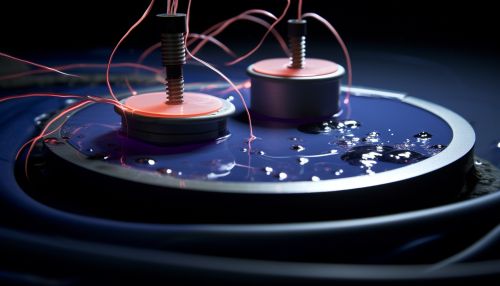Electrolysis
Introduction
Electrolysis is a process that uses an electric current to drive a non-spontaneous chemical reaction. This technique is often used in various industries, such as metallurgy and electroplating, and is a fundamental concept in the field of electrochemistry.
Principle of Electrolysis
The principle of electrolysis revolves around the movement of ions in a solution. When an electric current is passed through an electrolyte, the positive ions move towards the cathode (negative electrode) and the negative ions move towards the anode (positive electrode). This movement of ions constitutes the electric current in the solution.
Process of Electrolysis
The process of electrolysis involves several steps. First, an electric current is applied to the electrolyte. This causes the ions in the electrolyte to move towards their respective electrodes. At the electrodes, the ions undergo either oxidation or reduction reactions. Oxidation occurs at the anode, where electrons are lost, while reduction occurs at the cathode, where electrons are gained. The overall process results in the decomposition of the electrolyte.


Applications of Electrolysis
Electrolysis has a wide range of applications in various industries. In metallurgy, it is used for the extraction of metals from their ores, a process known as electrometallurgy. In electroplating, it is used to deposit a layer of metal onto a surface to provide corrosion resistance, wear resistance, or aesthetic qualities. Electrolysis is also used in the production of chemicals, such as chlorine and sodium hydroxide, through the chloralkali process. In addition, it is used in the electrolytic refining of metals and in the production of pure water.
Electrolysis in Electrochemistry
In electrochemistry, electrolysis is a fundamental concept. It is used to study the transfer of electrons in chemical reactions and to determine the standard electrode potentials of elements. Electrolysis experiments can also be used to measure the amount of substance produced in a chemical reaction, which can be used to determine the stoichiometry of the reaction.
Challenges and Future Directions
Despite its wide applications, electrolysis faces several challenges. These include the high energy consumption of the process, the need for expensive and rare catalysts, and the production of harmful by-products. However, research is being conducted to address these challenges and to develop more efficient and sustainable methods of electrolysis. For example, the use of renewable energy sources, such as solar and wind power, to drive the electrolysis process is a promising area of research.
